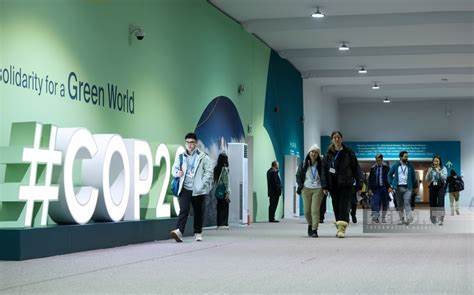BAKU, Azerbaijan – The COP29 climate summit ran into overtime on Friday, after a draft deal that proposed developed nations take the lead in providing $250 billion in annual climate finance by 2035 drew criticism from all sides.
Showing some progress late on Friday, the COP29 presidency released what it hopes will be a final deal for resolving rules around carbon markets.
But world governments at the UN climate summit were still working into the night on the contours of a sweeping funding plan to tackle climate change.
The two-week talks, being held in the Azerbaijan capital Baku, have been marked by division between wealthy governments resisting a costly outcome and developing nations pushing for more.
Many expected late Friday that the proposal for a $250 billion target could still rise.
“I’m so mad. It’s ridiculous. Just ridiculous,” said Panama’s climate envoy Juan Carlos Monterrey Gomez, criticizing the proposed target as too low. “It feels that the developed world wants the planet to burn.”
On the other side, a European negotiator told Reuters that the same proposal was uncomfortably high and did not do enough to expand the number of countries contributing to the funding.
“No one is comfortable with the number, because it’s high and (there is) next to nothing on increasing contributor base,” the negotiator said.
Analysts say that, for the EU and other contributors, the $250 billion target would require only a modest increase from what they are already spending on climate finance.
The final target would include $120 billion pledged by multilateral development banks, along with $65 billion in private investment that the banks projected would be brought in.
“Without much of a lift, developed countries should be able to meet that amount by 2030,” said David Waskow, director of the international climate initiative at the World Resources Institute.
Beyond the EU, those contributing countries would include Australia, the United States, Britain, Japan, Norway, Canada, New Zealand and Switzerland.
The draft invited developing countries to contribute voluntarily and emphasised that it would not affect their status as “developing” nations at the UN – a red line for countries including China and Brazil.
“This is not at a landing ground yet, but at least we’re not up in the air without a map,” said Germany’s special climate envoy Jennifer Morgan.
Late on Friday, the COP29 presidency published a hoped-for agreement for carbon markets, which could be approved on Saturday along with a final COP29 deal on climate finance.
Negotiations in Baku have been clouded by uncertainty over the future role of the United States, after the climate sceptic Donald Trump won the November 5 presidential election.
Trump, who takes office in January, has promised to withdraw the world’s top historic greenhouse gas emitter from global climate efforts.
















